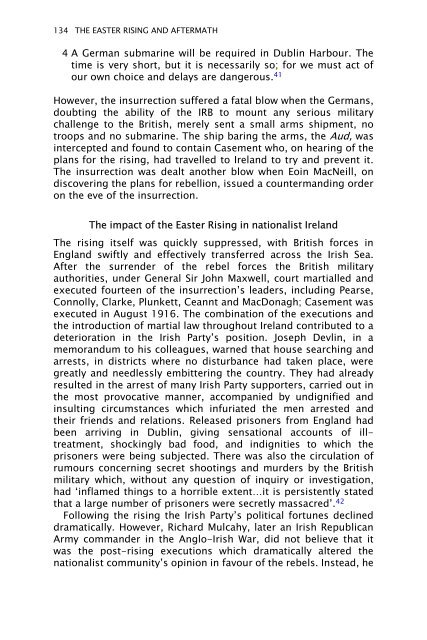Dividing Ireland: World War I and Partition
Dividing Ireland: World War I and Partition
Dividing Ireland: World War I and Partition
You also want an ePaper? Increase the reach of your titles
YUMPU automatically turns print PDFs into web optimized ePapers that Google loves.
134 THE EASTER RISING AND AFTERMATH<br />
4 A German submarine will be required in Dublin Harbour. The<br />
time is very short, but it is necessarily so; for we must act of<br />
our own choice <strong>and</strong> delays are dangerous. 41<br />
However, the insurrection suffered a fatal blow when the Germans,<br />
doubting the ability of the IRB to mount any serious military<br />
challenge to the British, merely sent a small arms shipment, no<br />
troops <strong>and</strong> no submarine. The ship baring the arms, the Aud, was<br />
intercepted <strong>and</strong> found to contain Casement who, on hearing of the<br />
plans for the rising, had travelled to <strong>Irel<strong>and</strong></strong> to try <strong>and</strong> prevent it.<br />
The insurrection was dealt another blow when Eoin MacNeill, on<br />
discovering the plans for rebellion, issued a counterm<strong>and</strong>ing order<br />
on the eve of the insurrection.<br />
The impact of the Easter Rising in nationalist <strong>Irel<strong>and</strong></strong><br />
The rising itself was quickly suppressed, with British forces in<br />
Engl<strong>and</strong> swiftly <strong>and</strong> effectively transferred across the Irish Sea.<br />
After the surrender of the rebel forces the British military<br />
authorities, under General Sir John Maxwell, court martialled <strong>and</strong><br />
executed fourteen of the insurrection’s leaders, including Pearse,<br />
Connolly, Clarke, Plunkett, Ceannt <strong>and</strong> MacDonagh; Casement was<br />
executed in August 1916. The combination of the executions <strong>and</strong><br />
the introduction of martial law throughout <strong>Irel<strong>and</strong></strong> contributed to a<br />
deterioration in the Irish Party’s position. Joseph Devlin, in a<br />
memor<strong>and</strong>um to his colleagues, warned that house searching <strong>and</strong><br />
arrests, in districts where no disturbance had taken place, were<br />
greatly <strong>and</strong> needlessly embittering the country. They had already<br />
resulted in the arrest of many Irish Party supporters, carried out in<br />
the most provocative manner, accompanied by undignified <strong>and</strong><br />
insulting circumstances which infuriated the men arrested <strong>and</strong><br />
their friends <strong>and</strong> relations. Released prisoners from Engl<strong>and</strong> had<br />
been arriving in Dublin, giving sensational accounts of illtreatment,<br />
shockingly bad food, <strong>and</strong> indignities to which the<br />
prisoners were being subjected. There was also the circulation of<br />
rumours concerning secret shootings <strong>and</strong> murders by the British<br />
military which, without any question of inquiry or investigation,<br />
had ‘inflamed things to a horrible extent…it is persistently stated<br />
that a large number of prisoners were secretly massacred’. 42<br />
Following the rising the Irish Party’s political fortunes declined<br />
dramatically. However, Richard Mulcahy, later an Irish Republican<br />
Army comm<strong>and</strong>er in the Anglo-Irish <strong>War</strong>, did not believe that it<br />
was the post-rising executions which dramatically altered the<br />
nationalist community’s opinion in favour of the rebels. Instead, he








